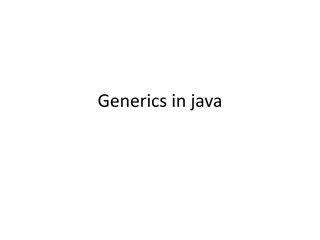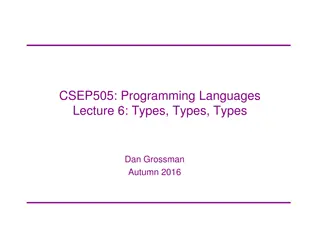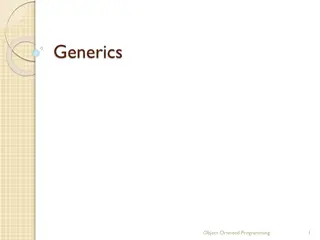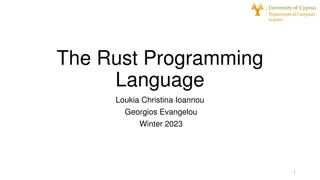
Java Generics and Subtyping Explained in CSE 331 Spring 2022
"Explore the intricacies of Java generics and subtyping in CSE 331 Spring 2022, covering generic classes, methods, and their implications. Understand the limitations, workarounds, and best practices for writing reusable code with generics."
Download Presentation

Please find below an Image/Link to download the presentation.
The content on the website is provided AS IS for your information and personal use only. It may not be sold, licensed, or shared on other websites without obtaining consent from the author. If you encounter any issues during the download, it is possible that the publisher has removed the file from their server.
You are allowed to download the files provided on this website for personal or commercial use, subject to the condition that they are used lawfully. All files are the property of their respective owners.
The content on the website is provided AS IS for your information and personal use only. It may not be sold, licensed, or shared on other websites without obtaining consent from the author.
E N D
Presentation Transcript
CSE 331 Software Design & Implementation Kevin Zatloukal Spring 2022 Generics
Generic Classes class NewSet<T> implements Set<T> { // rep invariant: // non-null, contains no duplicates // List<T> theRep; T lastItemInserted; } CSE 331 Spring 2022 2
Generics and subtyping Number Collection<Integer> List<Number> ? Integer List<Integer> List<Integer> interface List<T> extends Collection<T> { boolean add(T elt); T get(int index); } Java subtyping is invariant with respect to generics Not covariant and not contravariant Neither List<Number> nor List<Integer> subtype of other CSE 331 Spring 2022 3
Consequences of invariant subtyping class Utils { static double sumList(List<Number> lst) { double result = 0.0; for (Number n : lst) { result += n.doubleValue(); } return result; } } Cannot pass List<Double> to this method! List<Double> is not a subtype of List<Number> CSE 331 Spring 2022 4
Generic Methods class Utils { static <T extends Number> double sumList(List<T> lst) { double result = 0.0; for (Number n : lst) { // T also works result += n.doubleValue(); } return result; } } Can now pass List<Double> to this method Java can see that this is safe by checking the method body generic methods work around limitations of generic classes CSE 331 Spring 2022 5
Where are we? Done: basics of generic types for classes and interfaces basics of bounding generics Now: generics and subtyping generic methods [not just using type parameters of class] using bounds for more flexible subtyping using wildcards for more convenient bounds related digression: Java s array subtyping Java realities: type erasure unchecked casts equals interactions creating generic arrays CSE 331 Spring 2022 6
More verbose first Last Time: how to use type bounds to write reusable code despite invariant subtyping elegant technique using generic methods general guidelines for making code as reusable as possible (though not always the most important consideration) Today: Java wildcards essentially provide the same expressiveness less verbose: No need to declare type parameters that would be used only once better style because Java programmers recognize how wildcards are used for common idioms easier to read (?) once you get used to it CSE 331 Spring 2022 7
Best type for addAll interface Set<E> { // Adds all elements in c to this set // (that are not already present) void addAll(_______ c); } <T extends E> void addAll(Collection<T> c); Can pass a List<Integer> to addAll for a Set<Number> List<Integer> is a subtype of Collection<Integer> Collection<Integer> is allowed above have T = Integer and E = Number 8 CSE 331 Spring 2022
Where are we? Done: basics of generic types for classes and interfaces basics of bounding generics Now: generics and subtyping generic methods [not just using type parameters of class] using bounds for more flexible subtyping using wildcards for more convenient bounds related digression: Java s array subtyping Java realities: type erasure unchecked casts equals interactions creating generic arrays CSE 331 Spring 2022 9
Examples [Compare to earlier version] interface Set<E> { void addAll(Collection<? extends E> c); } More idiomatic (but equally powerful) compared to <T extends E> void addAll(Collection<T> c); More powerful than void addAll(Collection<E> c); CSE 331 Spring 2022 10
Wildcards Syntax: for a type-parameter instantiation (inside the < >), can write: ? extends Type, some unspecified subtype of Type ? is shorthand for ? extends Object A wildcard is essentially an anonymous type variable each ? stands for some possibly-different unknown type CSE 331 Spring 2022 11
? versus Object ? indicates a particular but unknown type void printAll(List<?> lst) { } Difference between List<?> and List<Object>: can instantiate ? with any type: Object, String, List<Object> much more restrictive: e.g., wouldn't take a List<String> Difference between List<Number> and List<? extends Number>: can instantiate ? with Number, Integer, Double, first version is much more restrictive CSE 331 Spring 2022 12
Non-example <T extends Comparable<T>> T max(Collection<T> c); No change because T used more than once must choose a name to say that two types must match CSE 331 Spring 2022 13
Wildcards Syntax: for a type-parameter instantiation (inside the < >), can write: ? extends Type, some unspecified subtype of Type ? is shorthand for ? extends Object A wildcard is essentially an anonymous type variable each ? stands for some possibly-different unknown type use a wildcard when you would use a type variable only once (no need to give it a name) communicates to readers of your code that the type s identity is not needed anywhere else CSE 331 Spring 2022 14
Wildcards Syntax: for a type-parameter instantiation (inside the < >), can write: ? extends Type, some unspecified subtype of Type ? is shorthand for ? extends Object ? super Type, some unspecified superclass of Type Wildcard can have lower bounds instead of upper bounds! says that ? must be Type or a superclass of Type CSE 331 Spring 2022 15
Type Bounds Upper Bound ? extends Number Lower bound ? super Number Object Object Number Number Integer Integer CSE 331 Spring 2022 16
Revisit copy method First version: <T> void copyTo(List<T> dst, List<T> src) { for (T t : src) dst.add(t); } More general version: <T1, T2 extends T1> void copyTo(List<T1> dst, List<T2> src) { for (T2 t : src) dst.add(t); } CSE 331 Spring 2022 17
More examples <T> void copyTo(List<? super T> dst, List<? extends T> src) { for (T t : src) dst.add(t); } Why this works: lower bound of T for where callee puts values upper bound of T for where callee gets values callers get the subtyping they want Example: copy(numberList, integerList) Example: copy(stringList, stringList) CSE 331 Spring 2022 18
PECS: Producer Extends, Consumer Super Should you use extends or super or neither? use ? extends T when you get values (from a producer) no problem if it s a subtype (the co-variant subtyping case) use ? super T when you put values (into a consumer) no problem if it s a supertype (the contra-variant subtyping case) use neither (just T, not ?) if you both get and put can t be as flexible here <T> void copyTo(List<? super T> dst, List<? extends T> src); CSE 331 Spring 2022 19
More on lower bounds As we ve seen, lower-bound ? super T is useful for consumers Upper-bound ? extends T could be rewritten without wildcards, but wildcards preferred style where they suffice But lower-bound is only available for wildcards in Java this does not parse: <T super Foo> void m(Bar<T> x); no good reason for Java not to support such lower bounds except designers decided it wasn t useful enough to bother \_( )_/ CSE 331 Spring 2022 20
Legal operations on wildcard types Object o; Number n; Integer i; PositiveInteger p; List<? extends Integer> lei; First, which of these is legal? lei = new ArrayList<Object>(); lei = new ArrayList<Number>(); lei = new ArrayList<Integer>(); lei = new ArrayList<PositiveInteger>(); lei = new ArrayList<NegativeInteger>(); CSE 331 Spring 2022 21
Legal operations on wildcard types Object o; Number n; Integer i; PositiveInteger p; List<? extends Integer> lei; First, which of these is legal? lei = new ArrayList<Object>(); lei = new ArrayList<Number>(); lei = new ArrayList<Integer>(); lei = new ArrayList<PositiveInteger>(); lei = new ArrayList<NegativeInteger>(); CSE 331 Spring 2022 22
Legal operations on wildcard types Which of these is legal? o = lei.get(0); n = lei.get(0); i = lei.get(0); p = lei.get(0); Object o; Number n; Integer i; PositiveInteger p; List<? extends Integer> lei; First, which of these is legal? lei = new ArrayList<Object>(); lei = new ArrayList<Number>(); lei = new ArrayList<Integer>(); lei = new ArrayList<PositiveInteger>(); lei = new ArrayList<NegativeInteger>(); CSE 331 Spring 2022 23
Legal operations on wildcard types Which of these is legal? o = lei.get(0); n = lei.get(0); i = lei.get(0); p = lei.get(0); Object o; Number n; Integer i; PositiveInteger p; List<? extends Integer> lei; First, which of these is legal? lei = new ArrayList<Object>(); lei = new ArrayList<Number>(); lei = new ArrayList<Integer>(); lei = new ArrayList<PositiveInteger>(); lei = new ArrayList<NegativeInteger>(); CSE 331 Spring 2022 24
Legal operations on wildcard types Which of these is legal? o = lei.get(0); n = lei.get(0); i = lei.get(0); p = lei.get(0); lei.add(o); lei.add(n); lei.add(i); lei.add(p); lei.add(null); Object o; Number n; Integer i; PositiveInteger p; List<? extends Integer> lei; First, which of these is legal? lei = new ArrayList<Object>(); lei = new ArrayList<Number>(); lei = new ArrayList<Integer>(); lei = new ArrayList<PositiveInteger>(); lei = new ArrayList<NegativeInteger>(); CSE 331 Spring 2022 25
Legal operations on wildcard types Which of these is legal? o = lei.get(0); n = lei.get(0); i = lei.get(0); p = lei.get(0); lei.add(o); lei.add(n); lei.add(i); lei.add(p); lei.add(null); Object o; Number n; Integer i; PositiveInteger p; List<? extends Integer> lei; First, which of these is legal? lei = new ArrayList<Object>(); lei = new ArrayList<Number>(); lei = new ArrayList<Integer>(); lei = new ArrayList<PositiveInteger>(); lei = new ArrayList<NegativeInteger>(); CSE 331 Spring 2022 26
Legal operations on wildcard types Object o; Number n; Integer i; PositiveInteger p; List<? super Integer> lsi; First, which of these is legal? lsi = new ArrayList<Object>; lsi = new ArrayList<Number>; lsi = new ArrayList<Integer>; lsi = new ArrayList<PositiveInteger>; lsi = new ArrayList<NegativeInteger>; CSE 331 Spring 2022 27
Legal operations on wildcard types Object o; Number n; Integer i; PositiveInteger p; List<? super Integer> lsi; First, which of these is legal? lsi = new ArrayList<Object>; lsi = new ArrayList<Number>; lsi = new ArrayList<Integer>; lsi = new ArrayList<PositiveInteger>; lsi = new ArrayList<NegativeInteger>; CSE 331 Spring 2022 28
Legal operations on wildcard types Which of these is legal? lsi.add(o); lsi.add(n); lsi.add(i); lsi.add(p); lsi.add(null); Object o; Number n; Integer i; PositiveInteger p; List<? super Integer> lsi; First, which of these is legal? lsi = new ArrayList<Object>; lsi = new ArrayList<Number>; lsi = new ArrayList<Integer>; lsi = new ArrayList<PositiveInteger>; lsi = new ArrayList<NegativeInteger>; CSE 331 Spring 2022 29
Legal operations on wildcard types Which of these is legal? lsi.add(o); lsi.add(n); lsi.add(i); lsi.add(p); lsi.add(null); Object o; Number n; Integer i; PositiveInteger p; List<? super Integer> lsi; First, which of these is legal? lsi = new ArrayList<Object>; lsi = new ArrayList<Number>; lsi = new ArrayList<Integer>; lsi = new ArrayList<PositiveInteger>; lsi = new ArrayList<NegativeInteger>; CSE 331 Spring 2022 30
Legal operations on wildcard types Which of these is legal? lsi.add(o); lsi.add(n); lsi.add(i); lsi.add(p); lsi.add(null); o = lsi.get(0); n = lsi.get(0); i = lsi.get(0); p = lsi.get(0); Object o; Number n; Integer i; PositiveInteger p; List<? super Integer> lsi; First, which of these is legal? lsi = new ArrayList<Object>; lsi = new ArrayList<Number>; lsi = new ArrayList<Integer>; lsi = new ArrayList<PositiveInteger>; lsi = new ArrayList<NegativeInteger>; CSE 331 Spring 2022 31
Legal operations on wildcard types Which of these is legal? lsi.add(o); lsi.add(n); lsi.add(i); lsi.add(p); lsi.add(null); o = lsi.get(0); n = lsi.get(0); i = lsi.get(0); p = lsi.get(0); Object o; Number n; Integer i; PositiveInteger p; List<? super Integer> lsi; First, which of these is legal? lsi = new ArrayList<Object>; lsi = new ArrayList<Number>; lsi = new ArrayList<Integer>; lsi = new ArrayList<PositiveInteger>; lsi = new ArrayList<NegativeInteger>; CSE 331 Spring 2022 32
Where are we? Done: basics of generic types for classes and interfaces basics of bounding generics Now: generic methods [not just using type parameters of class] generics and subtyping using bounds for more flexible subtyping using wildcards for more convenient bounds related digression: Java s array subtyping Java realities: type erasure unchecked casts equals interactions creating generic arrays CSE 331 Spring 2022 33
Java arrays We know how to use arrays: declare an array holding Type elements: Type[] get an element: x[i] set an element x[i] = e; Java included the syntax above because it s common and concise But can reason about how it should work the same as this: class Array<T> { public T get(int i) { magic } public T set(T newVal, int i) { magic } } So: If Type1 is a subtype of Type2, how should Type1[] and Type2[] be related?? CSE 331 Spring 2022 34
Java Arrays Given everything we have learned, if Type1 is a subtype of Type2, then Type1[] and Type2[] should be unrelated invariant subtyping for generics because arrays are mutable CSE 331 Spring 2022 35
Surprise! Given everything we have learned, if Type1 is a subtype of Type2, then Type1[] and Type2[] should be unrelated invariant subtyping for generics because arrays are mutable But in Java, if Type1 is a subtype of Type2, then Type1[]is a subtype of Type2[] (covariant subtyping) not true subtyping: the subtype does not support setting an array element to hold a Type2 (spoiler: throws an exception) Java (and C#) made this decision in pre-generics days needed to write reusable sorting routines, etc. also \_( )_/ CSE 331 Spring 2022 36
What can happen: the good LibraryHolding Programmers can use this subtyping to do okay stuff Book CD void maybeSwap(LibraryHolding[] arr) { if(arr[17].dueDate() < arr[34].dueDate()) // swap arr[17] and arr[34] } // client with subtype Book[] books = ; maybeSwap(books); // relies on covariant // array subtyping CSE 331 Spring 2022 37
What can happen: the bad Something in here must go wrong! LibraryHolding void replace17(LibraryHolding[] arr, LibraryHolding h) { arr[17] = h; } Book CD // client with subtype Book[] books = ; LibraryHolding theWall = new CD("Pink Floyd", "The Wall", ); replace17(books, theWall); Book b = books[17]; // would hold a CD b.getChapters(); // so this would fail CSE 331 Spring 2022 38
Javas choice Java normally guarantees run-time type is a subtype of the compile-time type this was violated for the Book b variable To preserve the guarantee, Java must never get that far: each array knows its actual run-time type (e.g., Book []) trying to store a supertype into an index causes ArrayStoreException (at run time) So the body of replace17 would raise an exception even though replace17 is entirely reasonable and fine for plenty of careful clients every Java array-update includes this run-time check (array-reads never fail this way why?) beware careful with array subtyping CSE 331 Spring 2022 39
Where are we? Done: basics of generic types for classes and interfaces basics of bounding generics Now: generic methods [not just using type parameters of class] generics and subtyping using bounds for more flexible subtyping using wildcards for more convenient bounds related digression: Java s array subtyping Java realities: type erasure unchecked casts equals interactions creating generic arrays CSE 331 Spring 2022 40
Type erasure All generic types become type Object once compiled List<String> lst = new ArrayList<String>(); at runtime, becomes List<Object> lst = new ArrayList<Object>(); Generics are purely a compiler feature! CSE 331 Spring 2022 41
Type erasure example CSE 331 Spring 2022 42
Type erasure example Compile-time signature is add(String)but the bytecodes say CSE 331 Spring 2022 43
Type erasure All generic types become type Object once compiled gives backward compatibility (a selling point at time of adoption) at run-time, all generic instantiations have the same type Cannot use instanceof to discover a type parameter Collection<?> cs = new ArrayList<String>(); if (cs instanceof Collection<String>) { // illegal ... } CSE 331 Spring 2022 44
Generics and casting Casting to generic type results in an important warning List<?> lg = new ArrayList<String>(); // ok List<String> ls = (List<String>) lg; // warn Compiler gives a warning because this is something the runtime system will not check for you Usually, if you think you need to do this, you're wrong a real need to do this is extremely rare Object can also be cast to any generic type public static <T> T badCast(T t, Object o) { return (T) o; // unchecked warning } CSE 331 Spring 2022 45
The bottom-line Java guarantees a List<String> variable always holds a (subtype of) the raw typeList Java does not guarantee a List<String> variable always has only String elements at run-time will be true if no unchecked cast warnings are shown compiler inserts casts to/from Object for generics if these casts fail, hard-to-debug errors result: often far from where conceptual mistake occurred So, two reasons not to ignore warnings: 1. You re violating good style/design/subtyping/generics 2. You re risking difficult debugging CSE 331 Spring 2022 46
Recall equals class Node { @Override public boolean equals(Object obj) { if (!(obj instanceof Node)) { return false; } Node n = (Node) obj; return this.data.equals(n.data); } } CSE 331 Spring 2022 47
equals for a parameterized class Erasure: Type arguments do not exist at runtime class Node<E> { @Override public boolean equals(Object obj) { if (!(obj instanceof Node<E>)) { return false; } Node<E> n = (Node<E>) obj; return this.data.equals(n.data); } } CSE 331 Spring 2022 48
equals for a parameterized class class Node<E> { @Override public boolean equals(Object obj) { if (!(obj instanceof Node<E>)) { return false; } Node<E> n = (Node<E>) obj; return this.data.equals(n.data); } } More erasure: At run time, do not know what E is and will not be checked, so don t indicate otherwise CSE 331 Spring 2022 49
equals for a parameterized class class Node<E> { @Override public boolean equals(Object obj) { if (!(obj instanceof Node<?>)) { return false; } Node<?> n = (Node<?>) obj; return this.data.equals(n.data); } } Works if the type of obj is Node<Elephant> or Node<String> or Node<? extends Object> Leave it to here to do the right thing if this and n differ on element type Node<Elephant> Node<String> CSE 331 Spring 2022 50






















